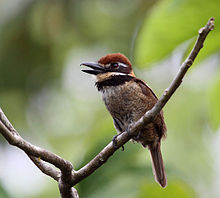| Chestnut-capped puffbird | |
|---|---|

| |
| Conservation status | |
 Least Concern (IUCN 3.1) | |
| Scientific classification | |
| Domain: | Eukaryota |
| Kingdom: | Animalia |
| Phylum: | Chordata |
| Class: | Aves |
| Order: | Piciformes |
| Family: | Bucconidae |
| Genus: | Bucco |
| Species: | B. macrodactylus |
| Binomial name | |
| Bucco macrodactylus (Spix, 1824) | |

| |
| Synonyms | |
| |
The chestnut-capped puffbird (Bucco macrodactylus) is a species of bird in the family Bucconidae, the puffbirds, nunlets, and nunbirds. It is found in Bolivia, Brazil, Colombia, Ecuador, Peru, and Venezuela.
Taxonomy and systematics
The chestnut-capped puffbird has variously been placed in genera Bucco, Argicus, and Cyphos. As of 2021, the International Ornithological Committee (IOC) and the Clements taxonomy place it in Bucco, while BirdLife International's Handbook of the Birds of the World (HBW) place it by itself in Cyphos. All three treat it as monotypic, though part of the Venezuelan population has sometimes been separated as B. m. caurensis.
Description
The chestnut-capped puffbird is 14 to 16.5 cm (5.5 to 6.5 in) long and weighs about 25 g (0.88 oz). Its plumage is unique among puffbirds. Its crown is chestnut, its nape a bright reddish orange, and the rest of the upperparts brown with a few lighter bars on the back and many on the rump. The tail is long, narrow, and warm dark brown. It has a thin white supercilium, black cheeks and lower throat with a white line between them, and a reddish white chin and upper throat. The chin feathers curl up over the base of the bill. Below the black throat is a white band and the rest of the underparts are buffy with fine dusky barring except on the lower belly. The bill is black, the eye red to brown, and the feet brownish- to greenish gray.
Distribution and habitat
The chestnut-capped puffbird is found in the upper Amazon Basin of southern Venezuela; eastern Colombia, Ecuador, and Peru; northern Bolivia; and western Brazil. It is found in many forest types but typically near water. Examples include terra firme and várzea forest, early successional and secondary forest, and gallery forest. It also occurs away from water in scrubby forest. It usually stays fairly low, from the undergrowth and understory to the subcanopy, and frequently perches within 6 m (20 ft) of the ground. In elevation it is usually found below 660 m (2,200 ft) but has been recorded as high as 1,000 m (3,300 ft) in Peru and once at 1,200 m (3,900 ft) in Ecuador.
Behavior
Feeding
The chestnut-capped puffbird forages by sallies from a perch to pluck insects from vegetation. It has also been reported to take small vertebrates.
Breeding
Almost nothing is known about the chestnut-capped puffbird's breeding phenology. One nest was a cavity in a termitarium about 2.5 m (8 ft) up in a tree.
|
Songs and calls Listen to chestnut-capped puffbird on xeno-canto |
Vocalization
The chestnut-capped puffbird's song is "a series of plaintive but abrupt rising notes ending in twitter, 'pup pup pep pep peep peep pip pip pip piz'".
Status
The IUCN has assessed the chestnut-capped puffbird as being of Least Concern. It has a very large range but an unknown population size that is believed to be decreasing. It is considered uncommon to locally common in various parts of its range.
References
- ^ BirdLife International (2016). "Chestnut-capped Puffbird Cyphos macrodactylus". IUCN Red List of Threatened Species. 2016. Retrieved 30 October 2021.
- ^ Gill, F.; Donsker, D.; Rasmussen, P. (July 2021). "IOC World Bird List (v 11.2)". Retrieved July 14, 2021.
- Remsen, J. V., Jr., J. I. Areta, E. Bonaccorso, S. Claramunt, A. Jaramillo, D. F. Lane, J. F. Pacheco, M. B. Robbins, F. G. Stiles, and K. J. Zimmer. Version 24 August 2021. Species Lists of Birds for South American Countries and Territories. https://www.museum.lsu.edu/~Remsen/SACCCountryLists.htm retrieved August 24, 2021
- Remsen, J. V., Jr., J. I. Areta, E. Bonaccorso, S. Claramunt, A. Jaramillo, D. F. Lane, J. F. Pacheco, M. B. Robbins, F. G. Stiles, and K. J. Zimmer. Version 24 August 2021. A classification of the bird species of South America. American Ornithological Society. https://www.museum.lsu.edu/~Remsen/SACCBaseline.htm retrieved August 24, 2021
- Clements, J. F., T. S. Schulenberg, M. J. Iliff, S. M. Billerman, T. A. Fredericks, J. A. Gerbracht, D. Lepage, B. L. Sullivan, and C. L. Wood. 2021. The eBird/Clements checklist of Birds of the World: v2021. Downloaded from https://www.birds.cornell.edu/clementschecklist/download/ Retrieved August 25, 2021
- HBW and BirdLife International (2020) Handbook of the Birds of the World and BirdLife International digital checklist of the birds of the world Version 5. Available at: http://datazone.birdlife.org/userfiles/file/Species/Taxonomy/HBW-BirdLife_Checklist_v5_Dec20.zip retrieved May 27, 2021
- ^ Rasmussen, P. C., N. Collar, and G. M. Kirwan (2020). Chestnut-capped Puffbird (Bucco macrodactylus), version 1.0. In Birds of the World (J. del Hoyo, A. Elliott, J. Sargatal, D. A. Christie, and E. de Juana, Editors). Cornell Lab of Ornithology, Ithaca, NY, USA. https://doi.org/10.2173/bow.chcpuf1.01 retrieved October 30, 2021
External links
| Taxon identifiers | |
|---|---|
| Bucco macrodactylus |
|
| Cyphos macrodactylus | |
